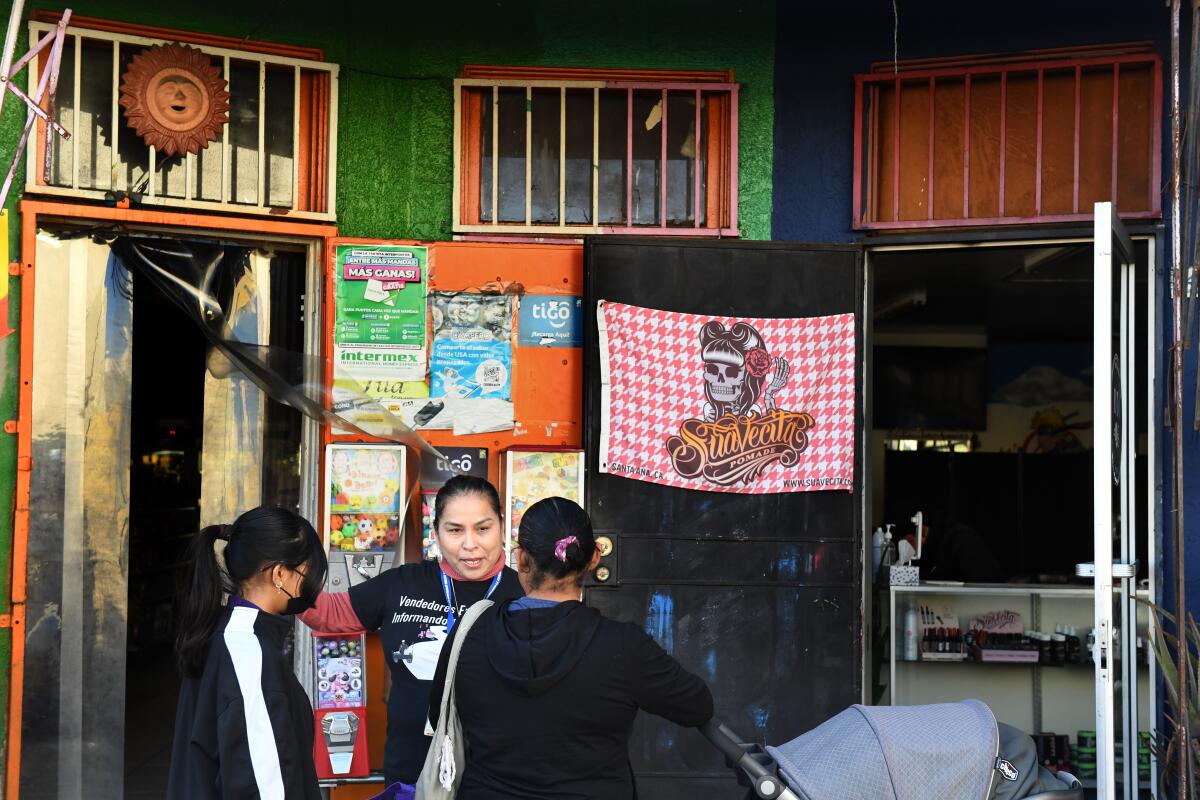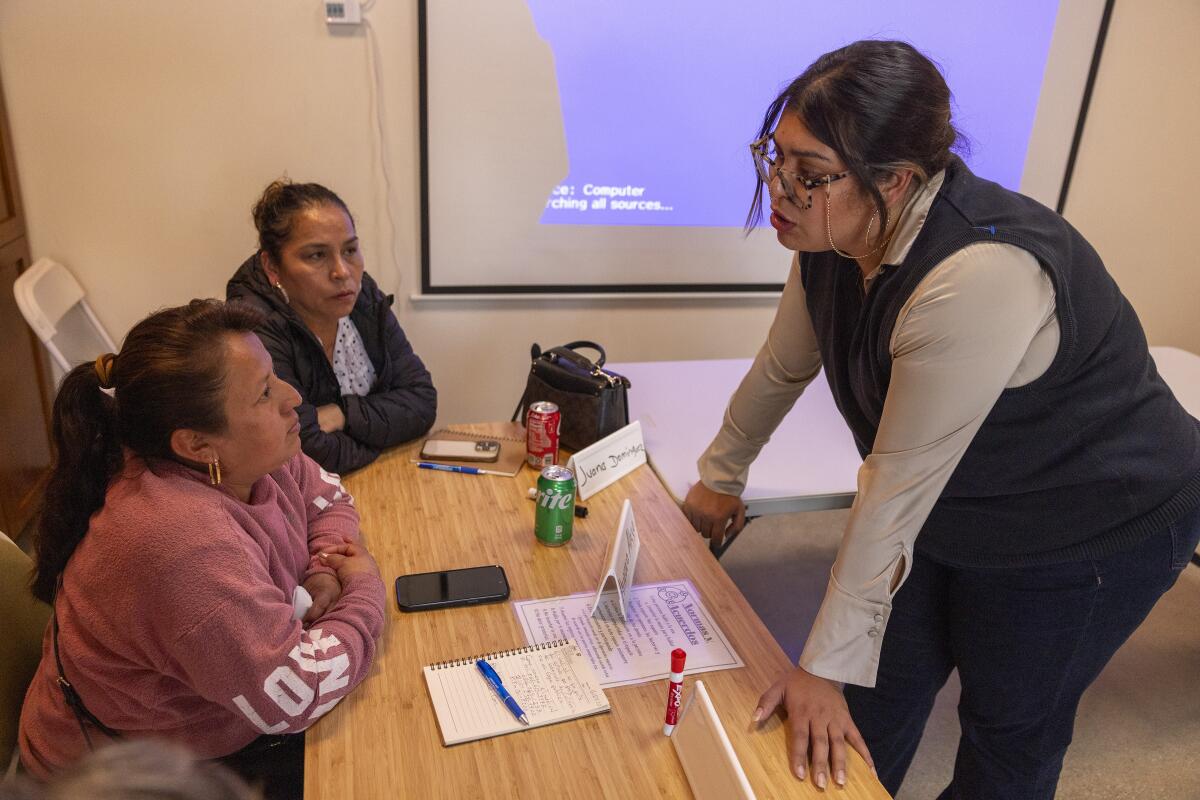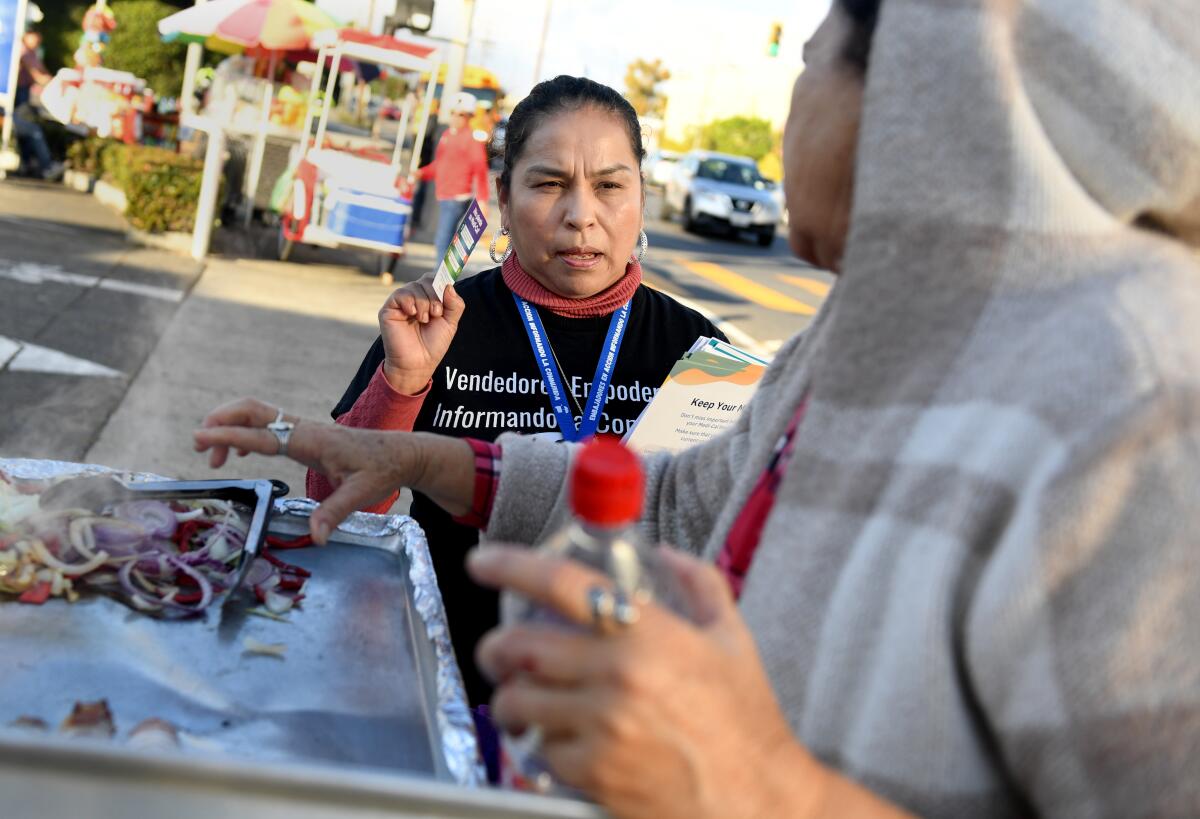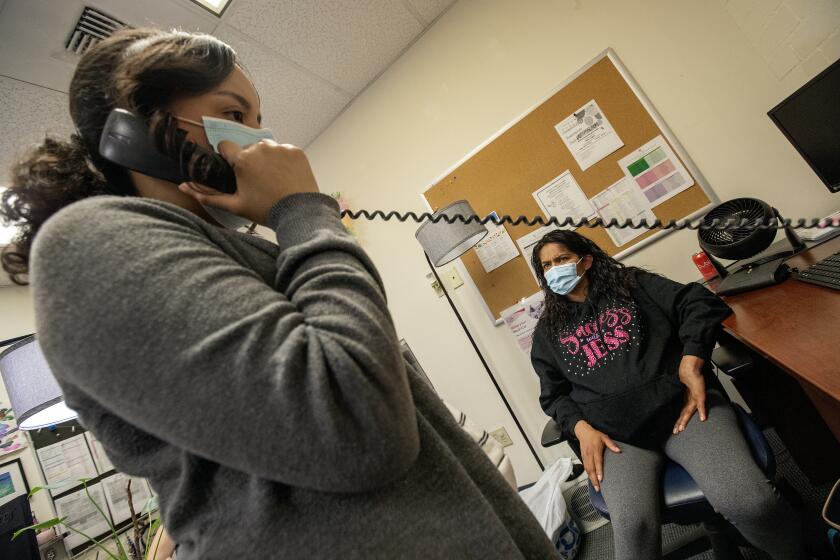Medi-Cal will soon be open to all, âpapers or no papers.â She wants her neighbors to know

As parents hustled to pick up their kids from a school in South Los Angeles, Juana Dominguez greeted one after another with the same question in Spanish: âDo you have Medi-Cal?â
âDonât be afraid to get it,â she urged mothers pushing strollers in the afternoon sun. She paused to chat up street vendors hawking raspados and hot dogs, encouraging them as well, as she handed out fliers.
Many already knew Dominguez from the brightly painted Paloma Market nearby, where she can regularly be found selling tacos at a table out front. On this stretch of Main Street, she also dishes out health information through a program that turns vendors into âcommunity messengers.â
Dominguez is on a mission to make sure her neighbors know that âpapers or no papers, youâre going to get help from Medi-Cal.â Thatâs because in January, the state will open its Medicaid program to anyone whose income is low enough to qualify, no matter their immigration status.
Itâs the culmination of a steady expansion of the California health insurance program, which has already grown to include children, young adults and seniors regardless of their legal status. As of last year, the uninsured rate among immigrants in California without U.S. citizenship was estimated to be 21% â lower than in 36 other states, according to a KFF analysis of data from the U.S. Census Bureauâs American Community Survey.
Next year, California will extend Medi-Cal benefits to the last remaining group of undocumented people â those ages 26 to 49 â in what is expected to be its biggest expansion of coverage since key provisions in the Affordable Care Act were implemented in 2014. State officials have estimated that more than 700,000 people will be eligible to gain âfull scopeâ coverage for the first time, helping them access important services such as preventative care and treatment for chronic conditions.

Dominguez wants people to be aware of the opportunity, and to make use of their new coverage. In California, people who lack valid visas, green cards or U.S. citizenship have been less likely than other immigrants to go to the doctor, with 29% saying they had never gotten or tried to get medical care in the U.S., a KFF/L.A. Times survey this year found.
Fear is rampant in the community, Dominguez said, as people worry that signing up for or using such benefits could jeopardize their chances of getting a green card or citizenship. Under the âpublic chargeâ rule, people can be blocked from legal status if they are likely to become âprimarily dependentâ on government aid.
Medi-Cal benefits do not factor into those decisions except in cases involving long-term stays in mental health or nursing institutions, advocates said. As Dominguez made her rounds on Main Street, she repeatedly reassured people: âItâs not a public charge for the government.â
Many immigrants are confused about what benefits and aid programs they can receive without being designated a public charge. Here are the facts.
Dozens of vendors such as Dominguez have been talking up Medi-Cal as part of an unusual program that mobilizes street vendors around public health issues that are important to them. The program, run by the community health network AltaMed in partnership with the nonprofit Inclusive Action for the City, launched nearly two years ago and provides vendors a quarterly stipend for their efforts.
The street vendors âidentified that their community members are undocumented people who have been historically excluded from all healthcare systems,â said Rosa Vazquez, manager for community mobilizing for the AltaMed Institute for Health Equity. Their biggest goal has been ensuring the people they reach get information âso that they can make the best choices for their own health.â
This year, that âhas meant a particular focus on Medi-Cal expansion,â Vazquez said.

In November, the vendors gathered at a Boyle Heights office to learn about the state effort. Vazquez laid out details about income limits for the program, what it would cover, and how people could apply.
In the KFF/L.A. Times survey, more than a third of California immigrants who are probably undocumented â those who said they did not have valid visas, green cards or citizenship â said they steered clear of public programs that help pay for food, housing or healthcare because they didnât want to draw attention to their own immigration status or that of a family member.
The survey also found that 70% were unsure if using such programs could decrease their chances of getting a green card, while another 16% believed that it would.
Under the Trump administration, a new rule added Medicaid to the list of assistance programs that could factor into public charge determinations. The rule was challenged in court and President Biden officially removed it shortly after taking office, but apprehension has remained.
Sarah Dar, a policy director with the California Immigrant Policy Center, said that âespecially under the previous presidential administration, there was a message being sent to these communities that youâre not deserving of public benefits and you shouldnât access services.â
For the Medi-Cal program to âall of a sudden be available to people, itâs going to take really trusted messengers to reach these folks,â she said during a November webinar hosted by the UCLA Latino Policy and Politics Institute and the California Endowment.
In Fresno, those trusted messengers could include Centro La Familia Advocacy Services, a nonprofit founded more than half a century ago to help immigrants apply for government programs that had forms only in English. The nonprofit will be extending its hours on Saturdays to accommodate farmworkers, who often canât make it to their centers during the week, as well as sharing information on Spanish-language Univision and heading directly to the fields to meet workers.
âIt is still difficultâ for many immigrants who lack the literacy skills to navigate Medi-Cal paperwork, even when translated into Spanish, said its executive director, Margarita Rocha.
The national debate over immigration has raged for decades but often ignores the lives of actual immigrants.
TODEC Legal Center, an immigrant advocacy organization, provides similar outreach in the Inland Empire. Farmworkers there âdonât come to government institutions for aid because of the fear,â said Luz Gallegos, the groupâs executive director. âWe have to go to them.â
Gallegos said TODEC has been trying to raise awareness about Medi-Cal for years, starting with the first expansion that covered children regardless of immigration status. It has recruited farmworkers who signed up for coverage for themselves or their kids to encourage others to apply. Now these volunteers show off their Medi-Cal cards and share stories about how they benefited from the program.
The group has also brought Riverside and San Bernardino county officials out to work sites to register farmworkers for Medi-Cal, with its own volunteers on hand to help establish trust.
And in Mendocino County, workers at Anderson Valley Health Center in Boonville have been heading out to local vineyards, asking companies to tuck informational fliers alongside pay stubs, and phoning uninsured patients to let them know about the upcoming expansion.
âThis group is probably the hardestâ to reach compared with those who have gotten Medi-Cal so far, said Chloe Guazzone, executive director of the health center. As patients, âthey donât tend to come to us unless thereâs an urgent issue because theyâre uninsured,â she said, âso finding them in the first placeâ can be difficult.
In Los Angeles, Dominguez said she was motivated to bring information to her community by the death of her friend Angel Vasquez, a kindly jokester who lived near Paloma Market.
When Vasquez got COVID-19 the first winter of the pandemic, he held off on calling for an ambulance, Dominguez said. She says she believes he was worried about the cost. His son, also named Angel Vasquez, said family members in Guatemala told the man to go to the hospital, but Vasquez initially insisted it was just a fever.
âHe went to the hospital very late â I think too late,â his son said.

Vasquez died in May 2021 at the age of 55, his son said. Dominguez was haunted by the thought that if he had gone to the hospital sooner, her friend might have lived.
âMy kids miss him a lot,â she said.
As she finished up her rounds on Main Street, she paused to point out where Vasquez had once lived. When she had the opportunity to reach out to neighbors about Medi-Cal, âI thought, âJuana, your community needs this information.â ... This gives me the drive to persist with it.â
California officials have estimated that more than 700,000 people will be able to transition from ârestricted scopeâ to âfull scopeâ Medi-Cal next year. Being in ârestricted scope,â which helps reimburse hospitals for emergency care, means âtheyâre in the system, we know who they are ... we know that theyâre income-eligible for Medi-Cal,â said Anthony Wright, executive director of the healthcare consumer advocacy group Health Access California.
âIt is an incredibly useful way to automatically enrollâ people who will now gain coverage for a range of care needed beyond the emergency room, Wright said. âWeâre really glad the state has taken efforts to try to do this as automatically and seamlessly as possible.â
The tentative figures are an early sign of the serious shift underway as the federal government has rolled back rules that helped people stay on Medicaid.
Californiaâs Department of Health Care Services said itâs unknown how many people who arenât already in the ârestricted scopeâ program will be newly eligible for Medi-Cal. The state has budgeted $1.4 billion for the expansion this fiscal year and $3.4 billion annually when it is fully implemented.
Researchers at UC Berkeley and UCLA estimate that among Californians under the age of 65, the Medi-Cal expansion will reduce the uninsured rate among immigrants without legal status from 58.4% to 27.8%. Despite that sharp reduction, it would still remain far higher than the estimated uninsured rate of 7% for all Californians in that age group.
Experts said hundreds of thousands of immigrants will remain uninsured because they make too much money to qualify for Medi-Cal, but donât have affordable coverage through their employers.
Wright said people in that situation can buy health insurance on their own, âbut then the question is, is it accessible? Is it affordable? Is it administratively easy?â
Those without legal status will remain ineligible for financial assistance to buy health coverage through Covered California, the state marketplace for insurance coverage. He and other advocates are now pushing the state to come up with an option to help them as well.
More to Read
Sign up for Essential California
The most important California stories and recommendations in your inbox every morning.
You may occasionally receive promotional content from the Los Angeles Times.
















